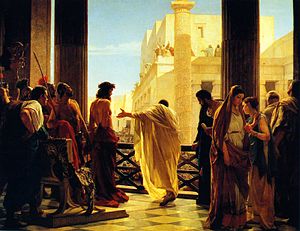a Sermon for Good Friday
Text: John 18:1-19:42
Reading the Passion narrative from the gospel we know as John provides the postmodern hearer with two challenges (besides the obvious, of course): dealing with John’s use of the phrase “The Jews” and the need to repent for the cross.

The writers of John use the phrase “The Jews” in a very broad way: different from the Synoptics: Mark, Matthew, and Luke. In their accounts, they are very clear to show that Jesus picked at and enraged the leadership. And when it came to their Passion narratives, they name the Pharisees, the chief priests, the scribes, and the elders as being who drive Rome to crucify Jesus. John’s writers make a very important point, that is not without theological merit: he names the leaders as representing the people. The impact of this is far-reaching.
Jews as nation. In calling the Jewish leadership “The Jews”, John’s writers are demonstrating an appropriate connection between leaders and the group as a whole. That there is no separating of leaders from flock: the leaders are the people and the people are the leaders. This is true because the Jewish people were/are a nation. In this way, Pilate is right to ask Jesus if He is “King of the Jews” and to ask the leaders if Jesus is their king. Their telling response is that they not only say no, but they affirm that their earthly king is their king: an unacceptable statement to Jewish tradition.
Jews as killers of Jesus. It is a short step, then, from this gospel to anti-semitism. It would not be inappropriate for the hearer to speak a phrase not in the gospel itself, but of this gospel, nonetheless: “The Jews killed Jesus.” However, this does not really say what we think it says, nor is it consistent with the other accounts. In arguing that the leadership are the people, the nation, we come to associate a monolithic response to Jesus. However, from the Synoptics, we see a very divided response: particularly that Jesus is supported by huge crowds of commoners and condemned by the many leaders. We can recognize today such a chasm between leaders and people throughout today’s affairs around the world.
The descendants as killers of Jesus. This intellectual leap from “the Jews” as a nation to “the Jews” as a monolithic block is what leads to the third jump to all Jews throughout history as being responsible for the death of Jesus. I do not believe this was the writers’ intention, but in the 1700 years since the era of Constantine, contemporary Jews in every age, including our own, have been held accountable for the death of Jesus and been called the killers of Christ through physical abuse, murder, and outright terrorism.
I don’t believe that the writers of John were composing an anti-Semitic gospel, nor do I think Jesus would in any way condone these things. In fact, much the opposite. The brutality of Christians on behalf of Jesus demonstrates an ignorance toward Jesus’s convictions and mission. The scandal of the cross is that humanity would think it is the master of its own fate. And yet Christians for centuries have used crosses to defend the cross. We haven’t redeemed this symbol from its horrible Roman origin, we have incorporated it and used it. We have taken up the practice of brutal and inhumane treatment of others and justified it through victim-hood. “You killed Jesus, so you must be punished” and then we make the small leap to say “I will punish you.”
On Good Friday, we share a story that isn’t merely about Jesus’s death, but the very conviction of brutality, abuse, and murder itself. That is what really stood trial before Pilate. The Roman practice of publicly brutalizing and killing dissidents was tried by this story and found guilty.
The second challenge for Christians in the cross is that we must continue seeking repentance for the cross. Not because we were those Roman soldiers that carried out the order, but because, in spite of our liberator’s teaching, we have used the cross throughout history and condemned others for Jesus. Even today, good Christian brothers and sisters here and abroad are abusing and even killing their brothers and sisters as a misguided defense of Jesus. Which tragically reveals a true ignorance toward Jesus. We must seek repentance and forgiveness for not bearing the cross, but condemning others to it.
I was taught in seminary that every sermon should be about trouble and grace. That we must always proclaim the Good News, not merely the bad. But I believe this is Good News. We are called to a new way, a way of redemption and peace for the people of GOD. We, like all of our ancestors, are bearers of a mission of reconciliation and new life. And this is good. This is grace. For we can be redeemed not only for our mistakes, but our transgressions, our sins, our evil. Even when we didn’t know it as evil. Even when we mistook it for good. We can be forgiven.
May this Good Friday be a day of reconciliation for you and all you have harmed, and may the grace of Jesus be a reminder of our true purpose and pursuit as the children of GOD. Amen.
Leave a Reply